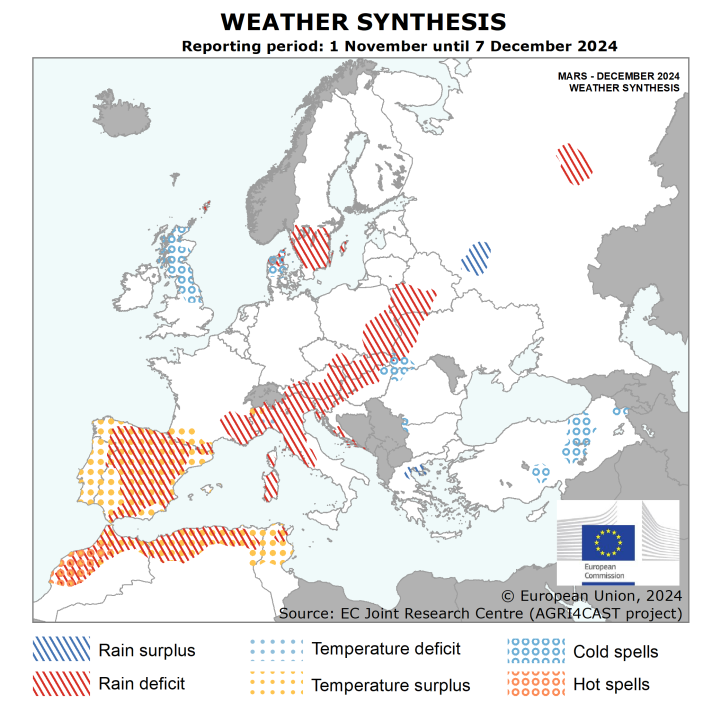
Rain deficit benefitted crops in several regions
Large parts of Europe experienced a considerable rain deficit during the reporting period (1 November to 7 December), albeit with no negative impacts on crops. Following a very rainy September and October in the Iberian peninsula, the near-absence of precipitation in November combined with above-average temperatures created beneficial conditions for an extended sowing window and enabled farmers to advance sowing operations rapidly.
In north-eastern Spain, particularly in Aragón, some overly wet fields could not be accessed on time; some farmers plan to sow shorter-cycle crop varieties in December and January to mitigate delays. In northern Italy too, dry conditions favoured the sowing and initial development of winter cereals.
In western, Europe, weather conditions were adequate to complete the sowing of winter cereals; despite delays, overall conditions are positive.
In central and northern Europe, where sowing had already been finished, mild cold spells had no negative impacts and soil water reserves remained well above critical levels.
Concerns remain about dry soil conditions in Sicily and Maghreb
In Sicily, rainfall during the reporting period was sufficient to create suitable conditions for the sowing of durum wheat. However, the situation remains delicate, as subsoils are still very dry.
In the Maghreb, unusually warm and drier-than-usual conditions continued. There is an immediate need for rainfall to create suitable conditions for sowing, most notably in Morocco and western Algeria.
Delay in the build-up of cold tolerance – this is of particular concern in underdeveloped crops in parts of Romania, Bulgaria, Ukraine and Russia
In many parts of Europe, the build-up of cold tolerance to withstand freezing conditions during the winter dormancy period is slightly delayed in crops that were sown at the usual time.
This is most markedly the case in Poland and the Baltic countries. However, winter crops’ vulnerability is of particular concern in eastern Ukraine, European Russia, southern-central Romania and north-eastern Bulgaria, where sowing and the initial development of winter wheat were seriously hampered due to very dry topsoils, resulting in crops that are currently underdeveloped and in poor condition.
Further information
Subscribe to the JRC MARS Bulletin | (Unsubscribe from your profile page)
JRC MARS (Monitoring Agricultural Resources) Bulletins
The latest information about global agricultural production hotspots for countries at risk of food insecurity is available on the JRC’s ASAP (Anomaly hot Spots of Agricultural Production).
Details
- Publication date
- 16 December 2024
- Author
- Joint Research Centre
- JRC portfolios





